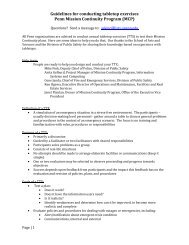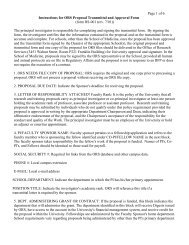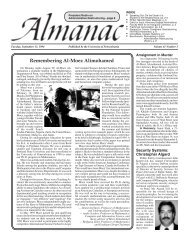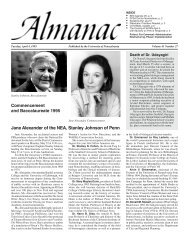Download this article (PDF) - University of Pennsylvania
Download this article (PDF) - University of Pennsylvania
Download this article (PDF) - University of Pennsylvania
- No tags were found...
Create successful ePaper yourself
Turn your PDF publications into a flip-book with our unique Google optimized e-Paper software.
Some Wordsfor NixonIn an excerpt from his new memoir, Speechwright,William Gavin ASC’62looks back at his time as a speechwriter for Richard Nixon, the first <strong>of</strong>several high-pr<strong>of</strong>ile political figures he served.In April 1967 a young high-school teacher named William Gavin ASC’62 satdown in his <strong>of</strong>fice at Penn’s Graduate School <strong>of</strong> Education and wrote a letterto a presidential hopeful named Richard Nixon. Inspired by a magazine<strong>article</strong> that had portrayed the candidate as having a serious shot at winningthe Republican presidential nomination despite his bitter presidential andgubernatorial defeats earlier that decade, Gavin wrote:Dear Mr. Nixon:May I <strong>of</strong>fer two suggestions concerning your plans for 1968? 1. Run.You can win. Nothing can happen to you, politically speaking, that isworse than what has happened to you. Ortega y Gasset says in “TheRevolt <strong>of</strong> the Masses”: “… these are the only genuine ideas; the ideas<strong>of</strong> the shipwrecked. All the rest is rhetoric, posturing, face. He whodoes not really feel himself lost, is lost without remission …” You, ineffect, are lost. That is why you are the only political figure with thevision to see things the way they are and not as leftist or rightistkooks would have them. Run. You will win.54 NOV | DEC 2011 THE PENNSYLVANIA GAZETTE ILLUSTRATION BY JONATHAN BARTLETT
MYfellow campaign aides, still applaudingExcerptand cheering, looked on in amazementand, I suspect, incomprehension. Whywas the brand-new 1968 presidential candidate <strong>of</strong> theRepublican Party, a world-class political figure, talking privatelywith <strong>this</strong> guy? The few who recognized me knew I wasa high-school English teacher.Now, as we stood together near an exit <strong>of</strong> the room, Nixonkept his right hand on my shoulder and said, with a bigsmile, “I just want to thank you for your contribution lastnight. You could tell I used your themes. After the speech Iwas looking for you, but we couldn’t find you.”I didn’t tell him that the reason I could not be found was thatI had not gone to the convention hall. I had stayed in the hotel,disconsolate, ready to go home to Abington, <strong>Pennsylvania</strong>, ifnot in ignominy, at least as a failure. … On the night <strong>of</strong> theacceptance speech, I had my pity party in the Nixon hospitalitysuite <strong>of</strong> the hotel with my campaign pal Jack Caulfield, aNew York City detective, who had been doing security workfor Nixon.Nixon started <strong>of</strong>f his speech with a pledge that <strong>this</strong> time(as opposed to 1960) he would win. A few minutes into thespeech I heard a little contribution I had made, just a phrase,nothing big. But I was surprised and delighted. So Nixonhad read the material I sent in at the last minute, before thestaff flew from the New York campaign headquarters toMiami Beach, and he had thought my words worth using. Atriumph. A minor triumph, <strong>of</strong> course, but as a speechwriter,you take what you can get. …I knew, just by the way Nixon was punching home those cheerlines, that he was really enjoying <strong>this</strong>, feeling the words, not justsaying them. And then, toward the end <strong>of</strong> the speech, he said,“And tonight, therefore, as we make <strong>this</strong> commitment, let us lookinto our hearts and let us look down into the faces <strong>of</strong> our children.In their faces is our hope, our love, and our courage. Tonight I seethe face <strong>of</strong> a child. He lives in a great city. He’s black. Or he’swhite. He’s Mexican, Italian, Polish. None <strong>of</strong> that matters. Whatmatters, he’s an American child. That child in that great city ismore important than any politician’s promise. He is America. Heis a poet, he’s a scientist, he’s a great teacher, he’s a proud craftsman.He’s everything we ever hoped to beand everything we dare to dream to be. Hesleeps the sleep <strong>of</strong> childhood and hedreams the dreams <strong>of</strong> a child.”“Jack,” I said, arising from my chair,“that’s my stuff!”I let out a yell that must have beenheard on the beach. This was my stuff,about children. Nixon had taken therisk <strong>of</strong> using my emotional, thoroughlyun-Nixon-like, atypical material that,Bill Gavin (right) shares a laugh with formerPresident Richard Nixon and House MinorityLeader Bob Michel in the latter’s <strong>of</strong>fice onMarch 8, 1990.And every time I look at the man,I think to myself, “When he was 19years old, he waded onto a beach, sixdays after D-Day. Young boys in theWehrmacht were trying to kill him.”And so when he went into politics, hedidn’t use metaphors like “This is war”and “We’re in the trenches.” He hadseen the real thing. And boy, I learnedearly on, he simply wouldn’t do that.I don’t think anybody ever said Bobwas eloquent. And I wouldn’t even saythey were greatly constructed words,because they were mine, and I justtried to do the job that was done. Butwhat he brought was <strong>this</strong> other part <strong>of</strong>rhetoric which is so mysterious, andthat is the presence <strong>of</strong> a human being.It’s mysterious. It is as mysterious asgreat art or music or anything else.Talk about that a little more.It’s very difficult to pinpoint exactlywhat that is because it isn’t alwaysthe same thing [with different people].With Obama it is <strong>this</strong> reasonable,pr<strong>of</strong>essorial, almost condescendingtype <strong>of</strong> rhetoric which seeks to impartto his audience the fact that whathe’s saying is not only right, but it’sreasonable. With Bob Michel it wasthe fact that here was a man who wasjust a guy from Peoria, and what hesaid was backed up by all that. Andwith Jim Buckley it was a much moreintellectual kind <strong>of</strong> thing.But in each <strong>of</strong> the three cases, itwas the presentation <strong>of</strong> a personawhich was likable, believable, andhad something that transcended therhetoric.A speech is more than words writtenfor somebody, or even sometimes morethan the delivery. It’s just somethingthere that people have, and it’s agift in public life. Not everybody hasit—but if you’ve got it, it’s worth almosteverything.THE PENNSYLVANIA GAZETTE NOV | DEC 2011 57
thought he was corny, so be it. He didn’t realize using thewith bad delivery, or just one misstep, could turn into sentimental58 NOV | DEC 2011 THE PENNSYLVANIA GAZETTEmush and make him a laughingstock. But he was incontrol <strong>of</strong> the material all the way. The changes he had madein the few muddled paragraphs I had sent to him gave mywords deeper meaning, because he had taken what I hadwritten and made it his own.word “corny” was itself corny.“But I know what works, goddamn it,” he continued. “Thespeeches need heart, anecdotes, parables.” …At <strong>this</strong> point I made a suggestion (“tell him what he needs”):“If the problem is that your critics say you don’t have heart,why not pick up on the passage from the acceptance speechShortly after Gavin was hired, a Nixon advisor named Bryce and have a kid, or a group <strong>of</strong> kids, come up on the platformHarlow told him that “a good speechwriter gives the boss with you at one <strong>of</strong> the rallies? You don’t speak to them, butwhat he wants. But a very good speechwriter also gives the while they are there, you talk about kids everywhere, theirboss what he needs. The two aren’t always the same, and sometimesyou have to tell him what he needs.” A few days laterGavin made his way to the front cabin <strong>of</strong> the plane to talk aboutspeechwriting with the candidate.Nixon, relaxed, legs crossed, was wearing a blue-checkedsports coat (where did he get those things?) and a blue tiewith a white shirt. He was twirling a pair <strong>of</strong> eyeglasses in hisleft hand. I had never seen him wear glasses in public. Henodded to me and then began to talk about the need for betterendings for his stump speech.“What I want,” he said “is little anecdotes, little parables, somethingwith heart. You can do that, Bill; you write with heart.”The three <strong>of</strong> us talked about the problem for a few minutes.The anecdotes could not be “corny,” Nixon said, but had tohave heart, “bring home a point.” …“I know they say I’m corny, but that doesn’t bother me,” hesaid, in what I would soon discover was a familiar pattern.“They” meant liberals or intellectuals on the left or peoplewho had Nixon on their enemies list—didn’t like him, hatedhim. But that didn’t bother him at all, and in fact he was gladthey didn’t like him. He welcomed their scorn, and if theyfuture, the way you did in Miami.”There was a long moment <strong>of</strong> silence. No, a long, longmoment <strong>of</strong> silence. Dick Moore cleared his throat and said,“Well, Bill, I don’t know …”Nixon said, “Bill, I couldn’t do that.”He looked out the scratched window next to him and thenturned back to me. “It’s not me,” he said. “Besides, they’ll sayI’m using the kids.”They. Always the They people. …I went back to my seat (on <strong>this</strong> day Bryce was not with us)and sat in gloom. I had made a fool <strong>of</strong> myself before the boss,maybe the only chance I would have to talk to him personallyfor I didn’t know how long. I should have thought out what Iwas going to say. I should have just kept my mouth shut. Ishould have done <strong>this</strong>. I should have done that. Tell him whathe needs. Oh, yeah?But in retrospect I think I did the right thing. I can see nowthat Nixon was amused at my naiveté. God only knows hehad enough—too many?—hard-bitten political pros on hiscampaign, so maybe my inexperience once again worked inmy favor. After all, my suggestion wasn’t that bad. But it alsoYou talk about “working rhetoric” and theneed to craft clear, punchy arguments forachievable goals. Who do you admire forthat today?I think the best place to look forworking rhetoric is going to be inthe acceptance speeches next year.[The Republican candidates] are notyet at the Holy Grail; they’re not yetpresident, and they can make theirinaugural addresses with all theappeals to history and everything.They’ve got to work, man; they’ve gotto cover all <strong>of</strong> their weaknesses, andthey’ve got to show you something.Most <strong>of</strong> the stuff that I am familiarwith from <strong>this</strong> race is in debates. Andin debates, you have to talk a kind <strong>of</strong> ahaiku. You have to talk in sound bitesand [answer] the quick question andthat kind <strong>of</strong> thing. So I’ll wait untilwhoever the nominee is, and we’ll seewhat happens.Now, obviously you have to getback to Obama. And as I said inthe book, he’s got a strange kind<strong>of</strong> articulateness. It’s more aboutwho he is than what he says. I don’tthink since he has become a nationalfigure he has said one memorablesentence. I suppose that goes formost political figures. They saybillions <strong>of</strong> words, and you’re goingto remember one thing. But I thinkhe’s the guy who has set the newstandard. And that’s why in thebeginning <strong>of</strong> the book I say, “Thankyou, Mr. President. You’ve broughtrhetoric back to where it should bein public affairs.”But my final analysis <strong>of</strong> him wouldbe he has a marvelous gift for almostconversational rhetoric. He doesn’t tryto soar for the heights very <strong>of</strong>ten. Andhe’s really good at that. But I thinkhe’s gone to the well once too <strong>of</strong>ten, if Imay coin a cliché. That’s my feeling.I was thinking <strong>of</strong> very cunninglytitling my book The End <strong>of</strong> Rhetoric,meaning two things: What is the end<strong>of</strong> rhetoric—its purposes, its goals?But also the end <strong>of</strong> rhetoric. We seemnot to have been given many greatspeeches or inspiring speeches,whatever it happens to be. And I think[Obama] really brought rhetoric backto a position where we’re looking athow people say things, as well as whatthe substance is.Now, can I break in and tell a story?By all means.I was in the second class <strong>of</strong> theAnnenberg School. Gilbert Seldes wasthe dean then. His idea was that theschool would have what he called ahumanist rather than a scientific oran analytical point <strong>of</strong> view. And wespent a lot <strong>of</strong> time discussing issues,one <strong>of</strong> which was: What is the differencebetween the public interest andthe public’s interest? In those days,
















